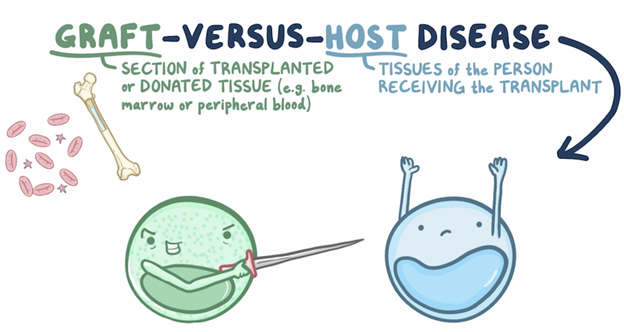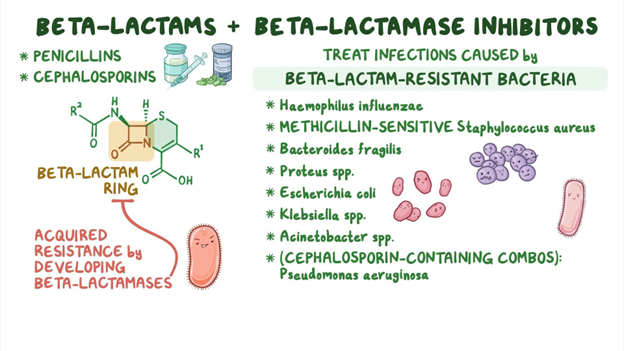A kidney transplant recipient stops immunosuppressive therapy three years after his surgery. Shortly after stopping therapy, he demonstrated clinical manifestations of kidney failure. Which type of reaction does this represent?
Cushing's syndrome
Hypersensitivity reaction Type I
Chronic graft versus host rejection
Acute host versus graft rejection
The Correct Answer is D
A. Cushing's Syndrome: This is a condition caused by prolonged exposure to high levels of cortisol, a hormone produced by the adrenal glands. It is not related to kidney transplant or immunosuppressive therapy.
B. Hypersensitivity Reaction Type I: Also known as an immediate hypersensitivity reaction or an allergy, this type of reaction involves the immune system's exaggerated response to an allergen. Symptoms can range from mild to severe and occur quickly after exposure to the allergen. While allergies can cause various symptoms, they do not specifically represent rejection of a transplanted organ.
C. Chronic Graft Versus Host Rejection: This term is commonly associated with bone marrow or stem cell transplants. It occurs when immune cells from the donated tissue recognize the recipient's body as foreign and attack various organs or tissues. This process typically happens over a more extended period and is not directly related to the scenario described.
D. Acute Host Versus Graft Rejection: This occurs when the recipient's immune system recognizes the transplanted organ as foreign and launches an immune response against it. It can happen shortly after transplantation if the recipient's immune system is not adequately suppressed. In this case, stopping immunosuppressive therapy can trigger acute rejection, leading to the failure of the transplanted organ.

Nursing Test Bank
Naxlex Comprehensive Predictor Exams
Related Questions
Correct Answer is D
Explanation
A. Aminoglycosides: Aminoglycosides are a different class of antibiotics. They do not have cross-sensitivity with penicillin. People who are allergic to penicillin can usually take aminoglycosides without a problem.
B. Erythromycins: Erythromycins are macrolide antibiotics. They are not related to penicillin structurally, so there is no cross-sensitivity between penicillin and erythromycins. People allergic to penicillin can generally take erythromycin without issues.
C. Quinolones: Quinolones, also known as fluoroquinolones, are a different class of antibiotics. They do not share a structural similarity with penicillin, so there is usually no cross-sensitivity between penicillin and quinolones. People allergic to penicillin can usually take quinolones without problems.
D. Cephalosporins: Cephalosporins are beta-lactam antibiotics, just like penicillins. They have a similar chemical structure to penicillins, which can lead to cross-sensitivity. Individuals who are allergic to penicillin might also have an allergic reaction to cephalosporins due to this structural resemblance. However, it's important to note that not all cephalosporins are the same, and the risk of cross-reactivity varies among different generations of cephalosporins. Healthcare providers need to assess the specific situation and choose an appropriate antibiotic if there is a known penicillin allergy.

Correct Answer is C
Explanation
A. Delayed hypersensitivity reaction: This type of hypersensitivity reaction, also known as Type IV hypersensitivity, involves a delayed response by the immune system and is mediated by T cells. It does not necessarily involve a failure of self-tolerance.
B. Antibody-mediated reaction: This type of hypersensitivity reaction, also known as Type II hypersensitivity, involves antibodies targeting specific antigens on cell surfaces, leading to cell destruction. It doesn't directly indicate a failure of self-tolerance but rather an immune response against specific cells or tissues.
C. Autoimmune reaction: In autoimmune reactions, the immune system fails to recognize certain body tissues or substances as "self," leading to an immune response against the body's own cells or tissues. This results from a breakdown in self-tolerance, where the immune system mistakenly targets its own body.
D. Immediate hypersensitivity reaction: This type of hypersensitivity reaction, also known as Type I hypersensitivity, involves an immediate response by the immune system to an allergen. It includes conditions like allergies and anaphylaxis, where the immune system reacts strongly to substances that are normally harmless. This response does not necessarily indicate a failure of self-tolerance but rather an exaggerated response to specific antigens.
Whether you are a student looking to ace your exams or a practicing nurse seeking to enhance your expertise , our nursing education contents will empower you with the confidence and competence to make a difference in the lives of patients and become a respected leader in the healthcare field.
Visit Naxlex, invest in your future and unlock endless possibilities with our unparalleled nursing education contents today
Report Wrong Answer on the Current Question
Do you disagree with the answer? If yes, what is your expected answer? Explain.
Kindly be descriptive with the issue you are facing.
